Business
National Leave Us Alone Week
The first week of April was once set aside as "National Leave Us Alone Week," but observance of this week has fallen by the wayside.The name suggests a celebration of anti-social curmudgeonliness. Unfortunately, the reason the week was invented was more prosaic.
It started in 1949 at the suggestion of PR consultant F. Lander Moorman of Douglas, GA. His idea was that, for one week, merchants should be left alone by solicitors.
Some details from the Congressional record of 1950:

Inevitably, the businessmen chose a Queen of Leave Us Alone Week.

Greenwood Commonwealth - Mar 20, 1950
Perhaps Leave Us Alone Week could be revived as a week in which all spammers and telemarketers have to leave us alone.
More in extended >>
Posted By: Alex - Fri Jan 31, 2025 -
Comments (4)
Category: Awards, Prizes, Competitions and Contests, Business, Holidays, Curmudgeons and Contrarianism, 1940s
Corporate Conformity, 1960
Mar 1960: Executives at Hiram Walker Inc. all wore masks of the company's president to honor his 25 years at the firm.
(click to enlarge)
image source: Life - Mar 7, 1960
Posted By: Alex - Mon Dec 23, 2024 -
Comments (2)
Category: Business, 1960s
Two by Steve Cutts
The creator's Wikipedia page.
Posted By: Paul - Tue Nov 26, 2024 -
Comments (0)
Category: Anthropomorphism, Business, Shopping, Cartoons, Satire
Kleenex - the cold cream remover
Kleenex tissues were introduced in the 1920s, but at first it didn't occur to the Kleenex marketing team that the product could be used for nose blowing. Instead, they marketed Kleenex as a cold cream remover.More from wikipedia:
A few years after the introduction of Kleenex, the Cellucotton's head researcher tried to persuade the head of advertising to try to market the tissue for colds and hay fever. The administrator declined the idea but then committed a small amount of ad space to mention of using Kleenex tissue as a handkerchief. By the 1930s, Kleenex was being marketed with the slogan "Don't Carry a Cold in Your Pocket" and its use as a disposable handkerchief replacement became predominant.

Chicago Tribune - Nov 10, 1924
Posted By: Alex - Thu Aug 08, 2024 -
Comments (0)
Category: Business, Advertising, 1920s
Money Card
No need for a subliminal hook for future customers in this one--it's all explicit! Buy American Express Traveler's Cheques.The entry at Board Game Geek.
Posted By: Paul - Tue Jun 04, 2024 -
Comments (0)
Category: Business, Advertising, Games, Money, 1970s, Europe
Working on Sunday
The UK's Shops Act made it illegal to operate a shop on Sunday... unless one was Jewish (since the Jewish observed the sabbath on Saturday). So business owner Mike Robertson figured that to open his stores on Sunday he simply had to make his staff convert to Judaism.The Shops Act had other oddities. According to the London Telegraph, a shop could stay open if it was "in an officially designated 'holiday resort area'" or if it restricted sales to "certain kinds of perishable goods, like fruit, flowers and vegetables; medical and surgical appliances, newspapers, cigarettes and refreshments."
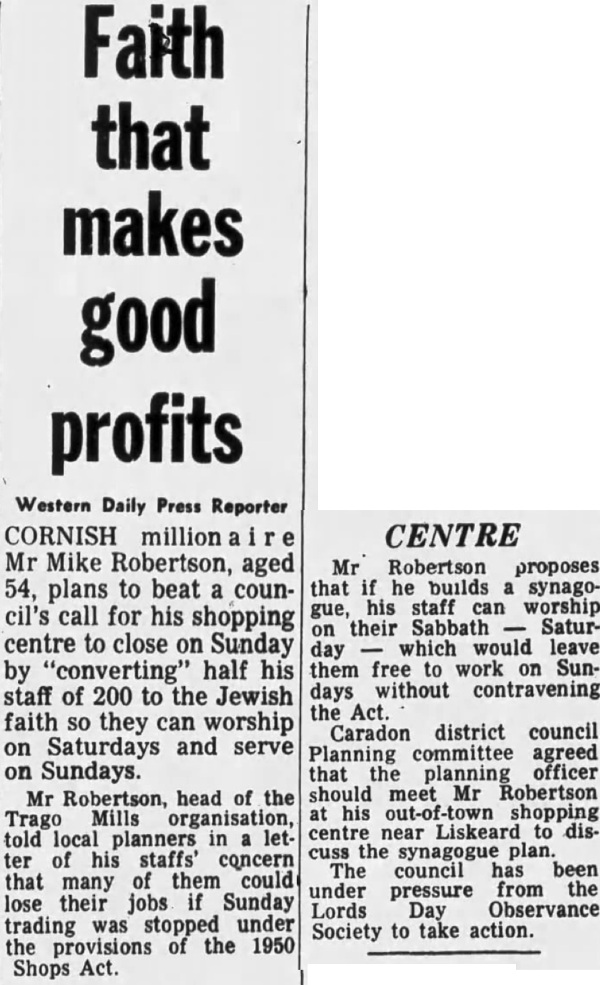
Bristol Western Daily Press - Mar 8, 1977
Posted By: Alex - Fri Mar 22, 2024 -
Comments (2)
Category: Business, Law, Religion, 1970s
Dog Collar with Decorative Tie
When you want to bring your dog to the office, he or she must be properly dressed in a business-like manner.Patent here.
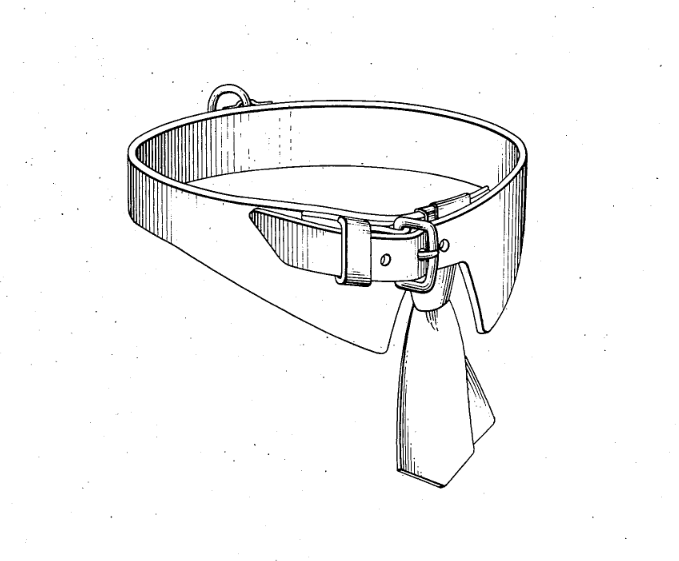
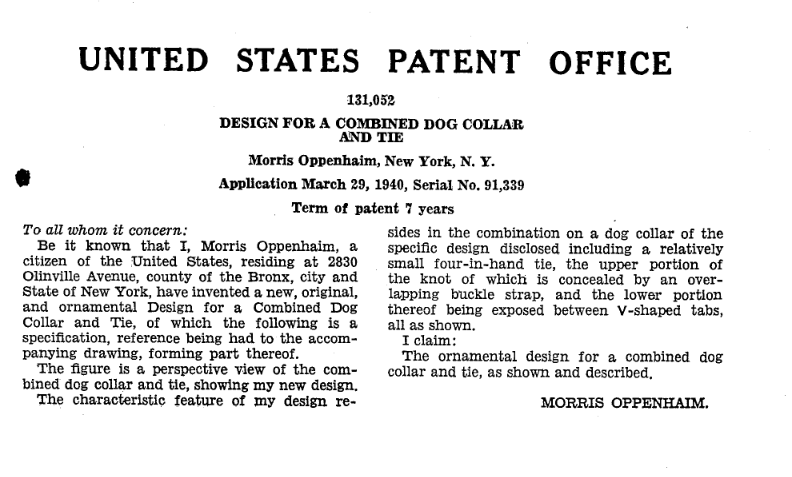
Posted By: Paul - Mon Nov 27, 2023 -
Comments (1)
Category: Business, Fashion, Patents, Dogs, 1940s
Follies of the Madmen #559
That endless red-carpet SFX is pretty impressive for the 1960s. Plus, an eight-track player!
Posted By: Paul - Thu Mar 16, 2023 -
Comments (2)
Category: Business, Advertising, Special Effects, 1960s, Cars
Rhapsody in Big Blue
Darryl Gammill came up with a way to convert stock-price movements into music. The result was the release in 1985 of "Rhapsody in Big Blue," which was a musical rendition of IBM's stock activity between April 1984 to April 1985.I haven't been able to find any samples of the album online. I can't even find any used copies of it for sale. This was evidently an extremely obscure record release.
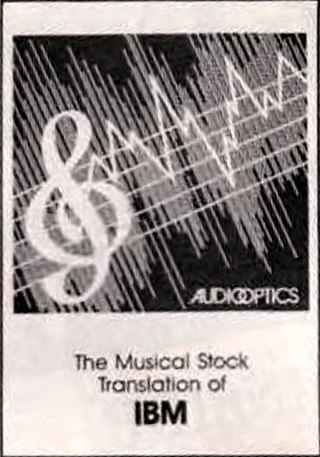
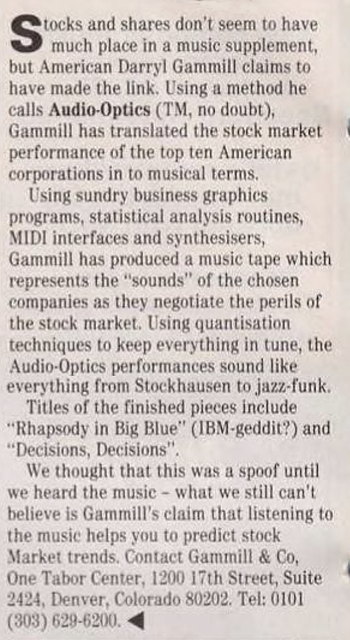
Popular Computing Weekly - April 3-9, 1987
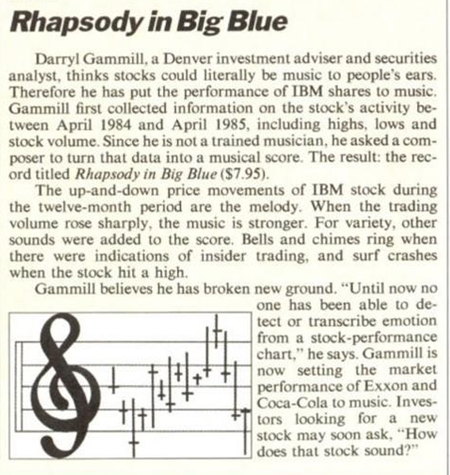
Time - Sep 16, 1985
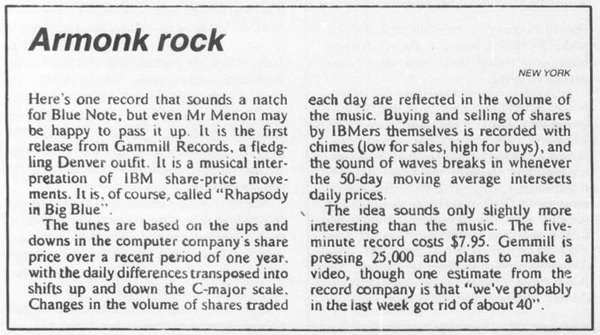
The Economist - Aug 31, 1985
Posted By: Alex - Mon Mar 06, 2023 -
Comments (2)
Category: Business, Music, 1980s
Rent-a-Drunk
For only $3 a night, Colin White would rent out one of the drunks from his pub to liven up a party.So his employees could legitimately claim to be professional drunks.
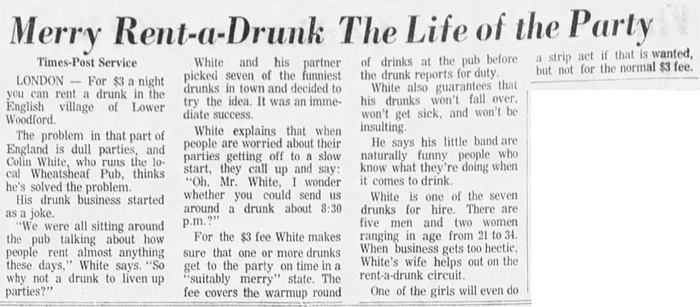
Asbury Park Press - Nov 26, 1971
Posted By: Alex - Wed Jan 11, 2023 -
Comments (3)
Category: Business, Inebriation and Intoxicants, Jobs and Occupations, 1970s

| Who We Are |
|---|
| Alex Boese Alex is the creator and curator of the Museum of Hoaxes. He's also the author of various weird, non-fiction, science-themed books such as Elephants on Acid and Psychedelic Apes. Paul Di Filippo Paul has been paid to put weird ideas into fictional form for over thirty years, in his career as a noted science fiction writer. He has recently begun blogging on many curious topics with three fellow writers at The Inferior 4+1. Contact Us |




